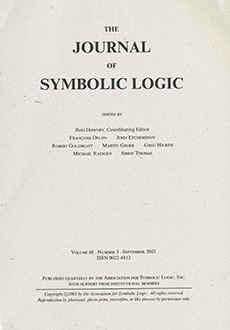Abstract
Traditional combinatory logic uses combinators S and K to represent all Turing-computable functions on natural numbers, but there are Turing-computable functions on the combinators themselves that cannot be so represented, because they access internal structure in ways that S and K cannot. Much of this expressive power is captured by adding a factorisation combinator F. The resulting SF-calculus is structure complete, in that it supports all pattern-matching functions whose patterns are in normal form, including a function that decides structural equality of arbitrary normal forms. A general characterisation of the structure complete, confluent combinatory calculi is given along with some examples. These are able to represent all their Turing-computable functions whose domain is limited to normal forms. The combinator F can be typed using an existential type to represent internal type information.
Citation
Barry Jay. Thomas Given-Wilson. "A combinatory account of internal structure." J. Symbolic Logic 76 (3) 807 - 826, September 2011. https://doi.org/10.2178/jsl/1309952521
Information





